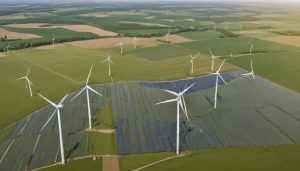Rising gas prices economic impact on everyday life
Anúncios
Rising gas prices have significant economic impacts, leading to higher transportation costs, inflation, and changes in consumer spending while prompting government responses and encouraging shifts toward alternative energy sources.
Rising gas prices economic impact touches every part of our lives, from how we commute to grocery shopping. It’s fascinating to see how these fluctuations have the power to shape our daily routines and overall economic health.
Anúncios
Understanding the causes of rising gas prices
Understanding the causes of rising gas prices is essential for consumers to navigate the economic landscape. Various factors contribute to these price increases, impacting not only how much we pay at the pump but also the broader economy.
One significant factor is the fluctuation in crude oil prices. When global demand increases or supply is disrupted, such as during geopolitical tensions, prices can soar dramatically.
Anúncios
Key Factors Influencing Gas Prices
Here are some key influences on gas prices:
-
⚖️ Supply and Demand: Higher demand in the summer often leads to increased prices
-
🏭 Refinery Issues: Maintenance or accidents at refineries can disrupt supply
-
🧾 Taxes and Regulations: State and federal taxes can significantly affect gas prices
Additionally, seasonal changes and the transition to different fuel blends can lead to temporary price hikes. It’s also essential to monitor international markets and OPEC’s influence on crude production limits.
For detailed information on oil markets, you can read more on the U.S. Energy Information Administration (EIA).
Economic impact on household budgets
The economic impact on household budgets due to rising gas prices can be substantial. Families may find themselves adjusting their spending habits as they try to manage increased fuel costs.
When gas prices rise, it often means higher transportation costs, which can affect daily commutes and travel plans.
How Rising Gas Prices Affect Budgets
Here are a few key areas where household budgets may be impacted:
-
🚗 Transportation Costs: Increased gas prices can lead to higher expenses for driving, especially for those with long commutes
-
🛒 Increased Prices for Goods: Many products require transportation, and gas prices can drive up costs at the grocery store
-
💳 Budget Reallocations: Households may need to cut back on other expenses, such as entertainment or dining out, to compensate for higher fuel costs
Families may also adapt by finding ways to save on gas, such as carpooling or using public transportation. Every small change can help alleviate budget pressures in these challenging times.
For more insight into economic changes and their effects, refer to the Bureau of Labor Statistics (BLS).
Effects on transportation costs and choices
The effects on transportation costs and choices due to rising gas prices are significant. With the cost of fuel increasing, individuals and families often reconsider how they travel.
A surge in gas prices can lead to a change in transportation habits, such as choosing public transit over driving or carpooling more frequently.
Impact on Transportation Decisions
Here are a few key changes people might make:
-
🚌 Public Transportation: More people may opt for buses or trains to save costs
-
🚗 Carpooling: Sharing rides with coworkers or friends can reduce fuel expenses
-
🗺️ Alternative Routes: Drivers might avoid congested areas to improve fuel efficiency
In some cases, rising prices can push consumers to consider investments in fuel-efficient vehicles or even electric cars as a long-term solution. Individuals will also think about their travel distance, favoring closer destinations when possible.
For additional insights on transportation economics, you can check out the U.S. Department of Transportation.
Influence on food prices and supply

The influence on food prices and supply due to rising gas prices is significant and far-reaching. When gas prices go up, the cost of transporting food also increases, which can lead to higher prices at grocery stores.
Many food items are affected because they require transportation from farms to markets. This means that consumers may see inflation in food costs as fuel prices rise.
Effects on Food Prices
Several key factors show how gas prices impact food:
-
🚚 Transportation Costs: Higher fuel prices lead to increased shipping and delivery expenses
-
🌾 Production Costs: Farmers face higher costs for machinery and transportation, which can be passed onto consumers
-
🔄 Supply Chain Disruptions: Any disruptions in fuel supply can lead to delays in food delivery, affecting availability
These factors can make it hard for families to budget for groceries, forcing them to make tough choices about what to buy.
For more insights on food prices and market dynamics, refer to the Economic Research Service of the USDA.
How rising gas prices affect small businesses
Rising gas prices can significantly impact small businesses. As fuel costs increase, many small businesses face rising expenses that can affect their bottom line.
Higher gas prices can lead to increased operational costs, especially for businesses that rely on transportation, such as delivery services or mobile vendors.
Key Effects on Small Businesses
Here are a few ways rising gas prices can affect small businesses:
-
📦 Increased Delivery Costs: Businesses may have to pay more for shipping supplies and products, which can cut into profits
-
🚕 Higher Employee Costs: Companies might need to offer higher wages or reimbursements for employees commuting to work
-
💲 Customer Price Increases: To maintain profit margins, small businesses may pass on costs to customers, leading to higher prices
These challenges can create tough choices for small business owners. They may need to find new ways to cut costs or improve efficiency to survive. Some might even consider alternative fuel options or adjusting their service areas.
For more insights into the impact of gas prices on businesses, consider checking out the U.S. Small Business Administration (SBA).
Impact on inflation and consumer spending
The impact on inflation and consumer spending due to rising gas prices is significant and complex. When fuel prices increase, they don’t just affect the cost at the pump; they have a ripple effect throughout the economy.
As gas prices rise, the costs of goods and services tend to increase as well. This can lead to higher inflation rates, which can diminish consumer purchasing power.
How Rising Gas Prices Affect Inflation
Here are some key points to consider regarding gas prices and inflation:
-
💸 Increased Costs: As transportation costs rise, businesses may pass these costs on to consumers, leading to higher prices for everyday products
-
🛍️ Reduced Consumer Spending: When consumers spend more on fuel, they may have less to spend on other goods and services, slowing economic growth
-
📈 Inflationary Pressures: Rising gas prices can contribute to overall inflation, making it more expensive for families to live day-to-day
Many households will need to adjust their budgets to cope with these challenges. This shift can change the way people shop, prioritize spending, and save.
For more information on how inflation affects the economy, visit the Bureau of Labor Statistics (BLS).
Government responses to gas price increases
Government responses to gas price increases can vary widely, depending on the economic climate and political considerations. When gas prices rise significantly, governments often feel pressured to take action to protect consumers and businesses.
These actions can include various strategies aimed at stabilizing prices and supporting the economy.
Common Government Actions
Here are some typical government responses:
-
🛢️ Strategic Petroleum Reserves: Governments may release oil from reserves to increase supply and lower prices
-
💰 Subsidies and Tax Relief: Providing temporary financial relief through subsidies or tax cuts can help ease the burden on consumers
-
📋 Regulatory Measures: Implementing price controls or regulations on oil companies can be a way to curb excessive price hikes
These measures can help consumers in the short term, but they may also have long-term implications for energy policy and market stability.
For more details on energy policies and responses, refer to the U.S. Department of Energy.
Future trends in gas prices and alternatives

The future trends in gas prices and alternatives are closely watched by consumers and businesses alike. Predictions about gas prices can significantly impact economic planning and consumer behavior.
As environmental concerns rise and technology advances, there are notable shifts in how people view fuel consumption.
Emerging Trends to Watch
Several trends are shaping the future of gas prices and alternatives:
| 🔋 Trend | 📌 Impact |
|---|---|
| 🚗 EV Adoption | As electric vehicle usage grows, gasoline demand may decline over time. |
| 🌞 Renewable Energy | Increased investments in renewables can diversify energy sources and reduce dependence on fossil fuels. |
| 📜 Policy Changes | Government regulations targeting carbon reduction may reshape the fuel industry landscape. |
These trends suggest that while gas prices may fluctuate, the overall energy landscape will evolve. Consumers might need to adjust their habits as new technologies become mainstream. Understanding these changes can help individuals and businesses prepare for the future.
For further insights into energy forecasts and innovations, check out Energy Star.
In summary: Understanding the impact of rising gas prices
The rise in gas prices has far-reaching effects on households, businesses, and the economy as a whole. Consumers face higher costs at the pump, which can lead to changes in spending habits and budgeting.
Small businesses feel the strain as transportation and operational costs increase, prompting them to rethink their strategies. Governments respond through various measures to stabilize prices and support their citizens.
Looking ahead, trends like the rise of electric vehicles and renewable energy sources will redefine the landscape of fuel consumption. Staying informed about these changes will help people make smarter choices in an evolving market.
Understanding how these factors interact empowers consumers and businesses alike to adapt, prepare, and thrive in a world of rising gas prices.







